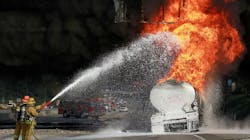HAMPTON, NH—Gov. Chris Sununu signed two pieces of legislation into law Tuesday to ban carcinogenic chemicals used in firefighting foams and flame suppression on household furniture during a ceremony at the town Fire Department Tuesday morning.
Senate Bill 257 bans the use of firefighting foams containing perfluoroalkyl chemicals, typically PFOA and PFOS, which are suspected carcinogens. SB 193 bans the sale of pieces of furniture sprayed with certain flame-retardant chemicals that can become toxic when ignited but also decompose over time into household dust and can be harmful to people even absent of a house fire.
Both bills are intended to better protect firefighters from contacting and ingesting toxic fumes while responding to a fire.
"We've had a generation or two or three of firefighters without understanding the exposure and the risk they were putting themselves into, especially when you have ... these flame-retardant chemicals within the home and the foams they are using to put out the fires," Sununu said. "Constant exposure over time is a real risk, and it has an incredible detriment to health."
Older firefighting foams containing PFOA and PFOS were advertised as safe for firefighters using them during their careers, according to SB 257's primary sponsor, Sen. Tom Sherman, D-Rye. So much so, he said in a statement, retiring Pease Air Force Base firefighters would be sprayed in these foams when they retired from duty. New Hampshire recently lowered its drinking water standards for PFOA and PFOS to 12 and 15 parts per trillion, respectively, down from 70 ppt, earlier this summer.
The chemicals are not biodegradable and have contaminated several private wells across the state. PFOA and PFOS are commonly referred to as PFAS chemicals, an umbrella term referring to the family of perfluoroalkyl substances.
In Stratham, for instance, the Volunteer Fire Department was identified as a possible source of PFOA and PFOS contamination in several private wells belonging to a handful of nearby businesses in the Town Center. The town is currently providing potable water to affected properties.
Sherman was unable to attend Tuesday's ceremony but provided a statement read by Sen. Jon Morgan, D-Brentwood, who was on hand for the signings.
"Only the manufacturers knew of its risk to those exposed; ulcerative colitis, hypertension in pregnancy, testicular cancer, bladder cancer and problems with our immune systems appear to be just the tip of the iceberg for the toxic impact of PFAS," Sherman's statement read. "In the environment (PFAS) doesn't degrade, persisting and accumulating in our soil, water supply and our fish."
SB 193 bans the sale of furniture and carpeting sprayed and carpeting with specific types of flame-retardant chemicals in New Hampshire. The legislation requires manufacturers and distributors to certify with the attorney general's office any furniture shipped to the state has not been sprayed with such chemicals.
Aside from the chemicals' toxicity in the event of a fire, Portsmouth Fire Capt. Bill McQuillen, president of Professional Firefighters of New Hampshire, said as the chemicals degrade over time, they can pose an ambient air health risk in homes by getting mixed into dust.
"It is our belief that these chemicals add no significant protection," McQuillen said. "What they're doing in inhibiting flame growth is promoting smoldering, which is allowing these fires to produce this toxic smoke that the public, and we are exposed to for a longer period of time. Additionally, these chemicals break down, they're off gas, and they're in dust."
The Hampton Fire Department knows too well the health risks associated with their work having endured the death of one their own, Kyle Jameson to a rare form of lymphoma in 2016. Hampton Fire Chief Jamie Ayotte said it meant a lot to the firefighters under his command to have Sununu sign both bills into law in Hampton.
"Cancer has reared its ugly head in Hampton, and we'll always remember Kyle," Ayotte said. "What he went through at the end was absolutely tragic so it's special to have the governor here today. We know firefighters have an increased cancer risk, so (we need to) make sure they're taken care of when they're exposed to carcinogens. If they get cancer, then we need to make sure we're taking care of them appropriately and that's one of the most important things going forward."
———
©2019 Portsmouth Herald, N.H.
Visit Portsmouth Herald, N.H. at www.seacoastonline.com/portsmouthherald
Distributed by Tribune Content Agency, LLC.






